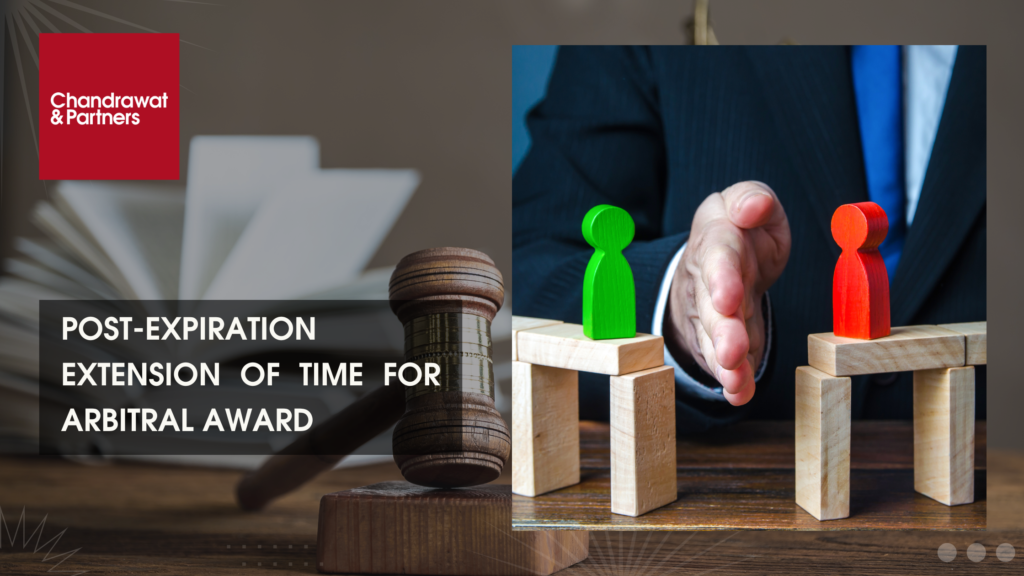Home > Recent Judgements > Post-Expiration Extension Of Time For Arbitral Award
Sept 27, 2024

POST-EXPIRATION EXTENSION OF TIME FOR ARBITRAL AWARD
The Supreme Court of India is set to address a pivotal issue in arbitration law. This matter, brought before the Court in a Special Leave Petition (SLP) challenging a ruling by the Calcutta High Court, carries considerable importance due to its potential to reshape the arbitration landscape in India. With arbitration widely regarded as an effective and efficient mechanism for resolving commercial disputes, the Supreme Court’s interpretation of Section 29A (It empowers the arbitral tribunal to fix costs, including fees, expert advice, and expenses, to ensure a fair and efficient arbitration process) will have a profound impact on how future arbitration proceedings are conducted and managed across the country.
BACKGROUND
The case of Rohan Builders (India) Pvt Ltd v. Berger Paints India Limited focused on Section 29A of the Arbitration and Conciliation Act, 1996, which sets strict deadlines for arbitration proceedings. Section 29A(1) requires arbitral tribunals to issue an award within 12 months of completing pleadings, with a possible extension of 6 months if both parties agree. However, under Section 29A(4), if the award is not issued within this period (either 12 or 18 months), the tribunal’s mandate automatically expires.
The Calcutta High Court ruled that once the mandate expires, the tribunal cannot be revived, and any application for an extension after the deadline is not permissible. This creates a significant issue for parties who miss the deadline, as the arbitration proceedings are effectively halted unless a new tribunal is appointed. The case underscores the challenge of balancing the need for timely arbitration with the flexibility to accommodate unavoidable delays in complex disputes.
ISSUES
The key issue in this case revolves around the proper interpretation of Section 29A of the Arbitration and Conciliation Act, 1996, and whether the mandate of an arbitrator can be extended after it has already lapsed due to the expiration of the prescribed time frame. The central legal question is whether a party can apply for an extension of time after the expiration of the arbitrator’s mandate or if such an application must be filed while the mandate is still in effect.
LEGAL PRINCIPLES INVOLVED
- Speeding Up Arbitration: Section 29A aims to ensure arbitration is fast and efficient by setting strict time limits for completing proceedings. If the tribunal doesn’t issue an award within the set time, its mandate automatically ends.
- Flexibility vs. Deadlines: The case questions whether the rigid time limits of Section 29A leave room for flexibility in complex cases where delays may be unavoidable, or if strict deadlines must always take precedence, even at the cost of adaptability in arbitration.
- Judicial Intervention in Arbitration: The case also addresses the scope of judicial intervention in arbitration proceedings. Section 29A allows courts to extend the time period for issuing an arbitral award under certain circumstances, but the question is whether this power can be exercised after the arbitrator’s mandate has expired. This raises important questions about the extent to which courts can and should intervene in the arbitration process, which is generally intended to be autonomous and free from excessive judicial interference.
DECISION AND JUSTIFICATION BY THE HIGH COURT
The Calcutta High Court adopted a stringent interpretation of Section 29A of the Arbitration and Conciliation Act, 1996, ruling that an arbitrator’s mandate automatically terminates upon the expiration of the 12-month period, or the additional 6-month extension if granted. The court determined that any request for an extension must be made before these deadlines. Once the period expires, the mandate cannot be revived, and the arbitrator loses the authority to continue with the arbitration.
This interpretation aligns with the legislative intent of Section 29A, which aims to ensure that arbitration proceedings are completed within a strict time frame to avoid unnecessary delays. The court emphasized the importance of adhering to these statutory deadlines to preserve the efficiency of arbitration as a dispute resolution mechanism. While acknowledging that some delays may be unavoidable, the court maintained that the proper course of action is to seek timely extensions from the court before the deadline, rather than allowing the mandate to be revived after expiration. This approach underscores the court’s commitment to maintaining the integrity and timeliness of arbitration proceedings.
JUDICIAL DETERMINATION
The Supreme Court’s decision in this case will be crucial for clarifying the application of Section 29A of the Arbitration and Conciliation Act. If the Court upholds the Calcutta High Court’s strict interpretation, it will stress the need for timely extension requests before deadlines expire, reinforcing adherence to statutory timelines and potentially reducing delays in arbitration. Conversely, a more flexible ruling allowing post-expiration extension applications would introduce practicality into the process, accommodating unavoidable delays and preserving the tribunal’s authority. This decision will significantly impact how arbitration timelines are managed and could affect arbitration practices and procedures in India going forward.
For more information or queries, please email us at
enquiries@chandrawatpartners.com




